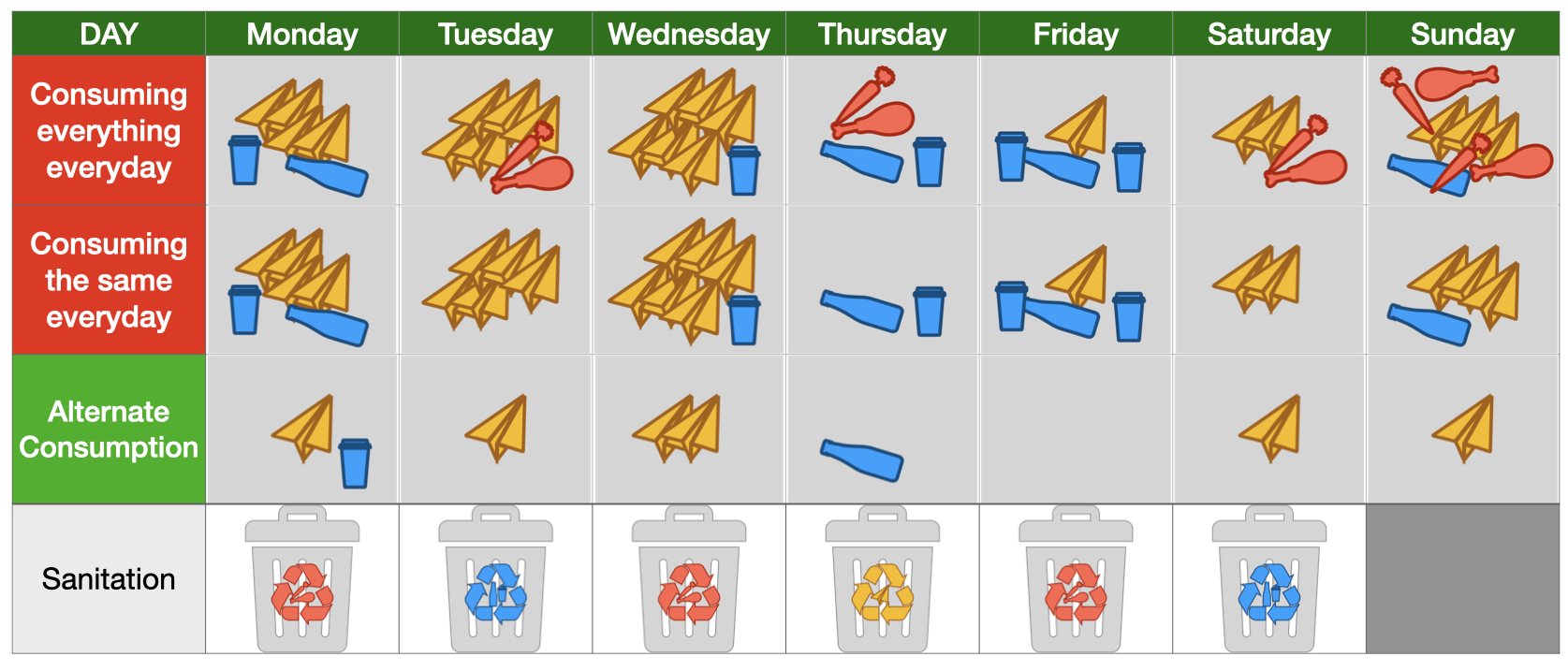In my previous post about the Healthy Colon I talked about the role of the colon and the bacterial flora that lives there. Let's see now why it is important to choose how to eat.
The different bacterial strains that make up the intestinal flora in our colon act as scavengers that process our waste, that is, the undigested residues of our diet, which arrive from the small bowel into the colon. Each strain is specialized in processing a specific type of waste. By acting on the composition of our waste, that is, on our diet, we can influence the intestinal flora and the function of our colon.
But rather than thinking about what to eat, let's try to understand how to eat.
To explain ourselves better, we can take for example the system of separate collection of urban waste.
Let's imagine that in our city we are used to separate our waste between paper, glass and cans, and organic waste.
Let's imagine that the Sanitation collects paper every Thursday, glass and cans every Tuesday and Saturday, organic waste every Monday, Wednesday and Friday.
Now let's see what would happen based on our consumption habits. Let's see in particular how we would be forced to accumulate our waste at home, before it is collected.
The different situations are summarized in the figure below.

Situation 1. If we choose to consume a bit of everything every day, we will produce every day waste of all kinds, which would accumulate in the house indistinctly. We will be forced to keep a considerable amount of waste at home, because every type of waste is not collected daily.
Situation 2. If, on the other hand, we choose to consume only a few things, but always the same every day, we will only partially solve the problem of waste accumulation. We will still be forced to keep a lot of waste at home, because the ones we produce (always the same every day) would not be collected every day.
Situation 3. Finally, if we choose to alternate our consumption, producing a different type of waste every day, our consumption would align with the rhythms of collection: the amount of waste that we will be forced to keep at home will be very limited.
Each bacterial strain in our colon adapts to consuming only some of our undigested food residues. Just like in the separate collection, the various bacterial strains process our waste, feeding on them with variable methods and times.
If, as in Situation 1, we eat everything every day (appetizer, first course, second course, cheese, dessert, fruit, perhaps in elaborate preparations), we will supply our colon with an indistinct amount of waste that would be processed badly and not completely.
The processing of undigested residues will be slower (they will accumulate in the colon with solid stools, which will pass more slowly giving constipation) or it will be hurt or incomplete (irritating stools or diarrhea).
The situation could be solved only by enhancing the collection, that is, at the price of a considerable and disordered growth of the bacterial population of our colon, with negative health outcomes.
If instead, as in Situation 2, our diet is monotonous and we are reduced to eating the same things every day, what will happen? We will always supply our colon with the same material, which will accumulate requiring longer times to be processed and disposed of. Constipation and irritation of the colon wall will result.
Furthermore, the bacterial strains that feed on our monotonous waste will grow out of all proportion, while the “unemployed and undernourished” strains will be overwhelmed and replaced: an imbalance of the intestinal flora will result.
Finally, if, as in Situation 3, we alternate our diet by varying the foods, using simple preparations and above all by not consuming them all together during meals, we will be able to optimize the processing of our waste. We will allow each bacterial strain to process its material without having to overlap others, completing the processing in the right time and generating feces that can be easily evacuated. Intestinal motility would not be hampered by large volumes of stool, and our intestinal flora would maintain its balance.
We often worry about what to eat, what foods are allowed or not.
Yet it would be more useful to worry about having a varied diet, to use simple and not too elaborate preparations, not to consume too many varieties of foods during the same meal.
If we then learn to eat slowly, chewing food correctly and not hastily swallowing them in large bites, our food will be well reached by the digestive juices, the nutrients will be completely absorbed in the small intestine and the residues will reach the colon ready to be managed by the bacterial flora.
Chewing badly and eating quickly means not differentiating our waste: our waste will contain poorly or partially digested residues, therefore difficult to manage for the colon bacteria.
This will result in inflammation of the colon, imbalances of the intestinal flora and the growth of pathogenic bacteria, normally not present in the colon but now able to survive thanks to their ability to consume our undigested residues (especially proteins), often leading to the production of substances that have an inflammatory and irritating action.
